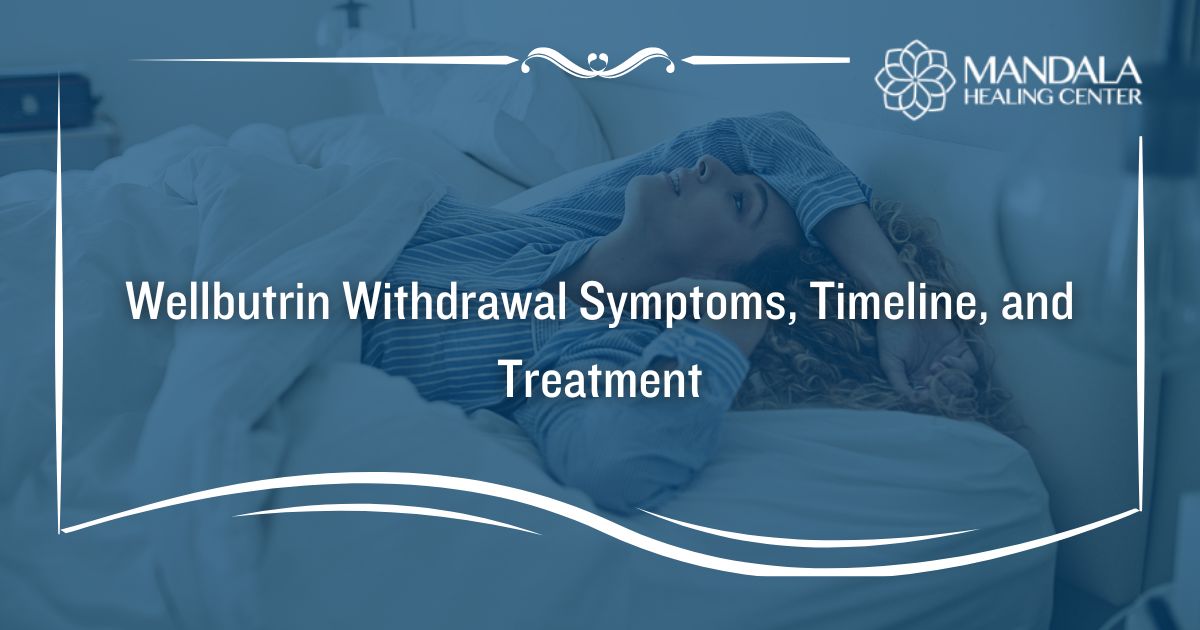Millions of people in the United States take medications to manage the symptoms of depression. Wellbutrin is a prescription medication used to treat major depressive disorder. When taken as prescribed, it can help reduce the symptoms of depression, such as low energy and depressed mood. However, people can also misuse Wellbutrin and develop a physical dependence on it.
Many prescription drugs, including Wellbutrin, have the potential for abuse and addiction. It’s important to recognize the symptoms of Wellbutrin abuse and seek treatment that allows you to overcome the physical, emotional, and behavioral aspects of substance abuse.
In many cases, a substance abuse treatment program will begin with a medically supported detox. Knowing what to expect during Wellbutrin withdrawal can help you stay focused on recovery, even when it feels challenging.
Reach out to the team at the Mandala Healing Center now to learn about our holistic substance abuse treatment programs or to schedule an intake assessment.
What is Wellbutrin?
Wellbutrin is the brand name for bupropion, a prescription medication used to effectively treat depression, attention deficit hyperactivity disorder (ADHD), and seasonal affective disorder (SAD).
Wellbutrin works by altering neurotransmitter levels in the brain and is safe and effective when taken as prescribed. However, long-term use and misuse of Wellbutrin can cause physical dependence and addiction.
Recognizing Wellbutrin Abuse
Wellbutrin abuse occurs when someone uses their prescription medications differently than prescribed, such as taking higher or more frequent doses or ingesting them differently. People may also abuse Wellbutrin by taking it recreationally–meaning without a medical purpose or prescription.
People who abuse Wellbutrin may seek the drug’s stimulant effects, which are reported to be similar to the effects of amphetamines or crack cocaine.
Common methods of Wellbutrin misuse include:
- Crushing and snorting Wellbutrin tablets
- Chewing Wellbutrin pills
- Dissolving Wellbutrin tablets in water and injecting it into a vein or muscle
People who abuse Wellbutrin by ingesting it in these ways are at risk of serious physical harm, including lacerations to the esophagus, breathing problems, and severe infections. Wellbutrin abuse is also more likely to lead to tolerance–meaning a person needs to use more of a drug to get the desired effects–and addiction.
Effects of Wellbutrin Abuse
Wellbutrin is widely considered safe when used under medical supervision as prescribed. But taking larger doses can lead to dangerous side effects, including:
- Seizures
- Irregular heartbeat
- Suicidal thoughts
- Weight loss
- Joint pain
- Constipation
- Hallucinations
People who take large doses of Wellbutrin may experience euphoria, which increases the likelihood they’ll continue to abuse it. People who use large or frequent doses of Wellbutrin will likely experience uncomfortable, sometimes hazardous withdrawal symptoms when they stop taking it.
Wellbutrin Withdrawal Symptoms
Wellbutrin affects the balance of neurotransmitters in the brain. When someone with Wellbutrin dependence stops taking it, they may experience withdrawal symptoms. It’s important to note that people can become dependent on Wellbutrin even if they take it as prescribed. As a result, healthcare professionals generally advise against stopping Wellbutrin abruptly. Instead, gradually reducing the dose can help individuals avoid withdrawal.
Common symptoms of Wellbutrin withdrawal include:
- Irritability
- Depression
- Aggressive behavior
- Suicidal thoughts
- Intense cravings
- Anxiety
- Insomnia
- Sweating
- Sensitivity to heat
- Flu-like symptoms
- Confusion
- Severe headache
People who become dependent on Wellbutrin must seek professional help to manage their withdrawal symptoms and stay safe during the detox process. Without assistance, many people attempting to quit Wellbutrin “cold turkey” may be unsuccessful.
Wellbutrin Withdrawal Timeline
Many factors can affect your Wellbutrin withdrawal timeline. People who have taken Wellbutrin for years may have longer-lasting, more severe withdrawal symptoms than those who have taken it for shorter periods.
Here is an example of a typical Wellbutrin withdrawal timeline.
24-48 hours
Symptoms typically begin within the first day or two after your last dose of Wellbutrin. Many people experience:
- Agitation
- Confusion
- Nausea
- Insomnia
- Flu-like symptoms
Many people experience intense cravings for Wellbutrin during the earliest stages of the Wellbutrin withdrawal timeline.
Day 3-5
Symptoms linger for several days, usually peaking between the third and fifth day. People experiencing Wellbutrin withdrawal symptoms require support, treatment, and supervision to prevent relapse.
Day 6 and beyond
Many people will experience relief from Wellbutrin withdrawal symptoms at this point, but those with longer periods of Wellbutrin use may still feel uncomfortable. Cravings can occur after physical and psychological symptoms disappear.
Each person will follow their own timeline of symptoms, so it’s important to have support and supervision throughout the detox process.
Treatment for Wellbutrin Withdrawal
Professional treatment and support can help you reduce and manage your Wellbutrin withdrawal symptoms so that you can have a safe, complete detoxification. Treatment for Wellbutrin withdrawal includes:
- Tapering off Wellbutrin slowly to reduce the intensity of withdrawal symptoms
- Holistic care, including nutrition support, massage, exercise, and other therapies to promote healing and increase comfort during detox
- Emotional support, including group and individual counseling when appropriate
The structure and support of a detox program can help you stay focused on recovery by holding you accountable and ensuring your safety and comfort. Detox and treatment programs are available in many settings and several levels of care to meet people’s unique needs during every stage of addiction recovery.
Find a Wellbutrin Detox Program
If you or someone in your life needs support to overcome Wellbutrin abuse or addiction, you are not alone. Contact the caring specialists at the Mandala Healing Center now to discover how our holistic treatment programs can empower you on your recovery journey. Don’t wait another day for the help and support you deserve. Call us today to get started.












